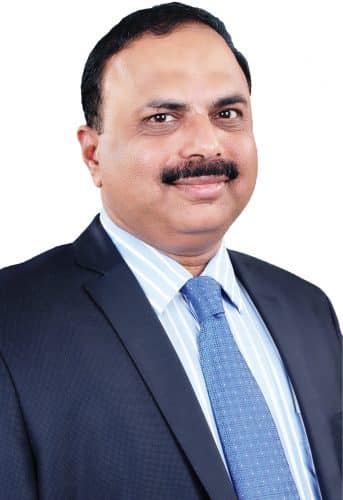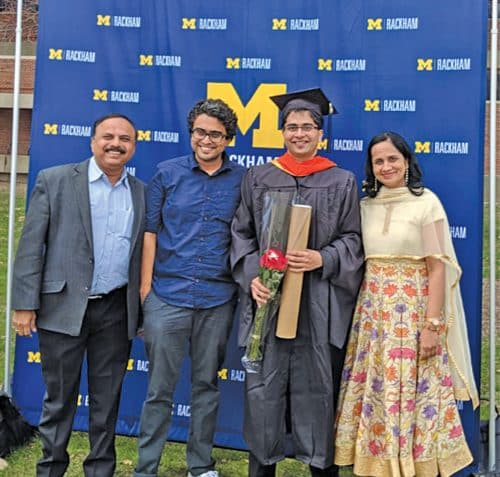Belonging to a middle-class family, Sanjeev Keskar learnt to be content in whatever was on the plate. However, his passion for knowledge always kept him on top of his game. Missing out on an engineering seat and working with a small firm has been the greatest lessons of his life. He has led not one but many American companies in India.
Helping startups in their journey with an early retirement from an active career, he helped the likes of National Semiconductor, Freescale Semiconductor, and AMD root their origins in India, the man who became the Chair of IESA and MD of Arrow Electronics. This is Sanjeev Keskar’s story!

Keskar, whose father worked with the Bank of Maharashtra, had to move with family whenever his father got transferred to a new city. As a matter of fact, transfers in that era usually took place every three or four years. Keskar completed his primary schooling from a school located in a small village called Mul in the district of Chandrapur (Maharashtra). He completed the 5th and 6th standard from a school in Pune, sixth to ninth standard from Nagpur, and tenth to twelfth from Aurangabad.
Asked if he was happy with the frequent transfers, Keskar replies that the best of his life lessons have come through these transfers and frequent changes in cities and schools. “Changing cities every three years really helped me in building new friends. Actually, these frequent transfers helped me cultivate a habit of networking and building relationships in the shortest possible time,” recalls Keskar.
It is evident from the experience Keskar gained in the industry that he is one of the best communicators present in the vertical of the electronics industry today. Keskar refers to himself as an average student when it comes to scoring grades but is proud of the fact that he was, and continues to be, a contributor to social causes, and also to all his employers he worked for. He has represented his school and college in badminton and dramas during various social activities.
Keskar was looking forward to joining an engineering college after passing out from the school in 1982. But as fate would have it, he missed securing an engineering seat by a couple of marks, and there were not many private engineering colleges offering seats at that time. “All my friends made it to engineering colleges. I was very nervous at that time as I was very confident that I would make it to an engineering college. I was clueless as to what to do next,” recalls Keskar.

Priceless 700-rupee salary
Fate played a big role in helping Keskar on how he would be known in the electronics industry one day. He joined a diploma course in electronics at Maratha Mandal Polytechnic in Belgaum. “It was a three-year diploma and I completed it sincerely. But then came a time when I had to decide what to do next. I had the diploma in my hands, and I was not sure what to do next,” notes Keskar.
His father was once again transferred to Pune and Keskar decided to move to Pune in 1985 with the family. Left with two choices – either to join second year in a full-time engineering college or to start a career, Keskar chose the latter. He saw an advertisement from a company named SAJ Froude. This company was hiring for the post of trainee engineers for their plant located in Pune.
Keskar applied for the same and began his career in the automotive testing equipment domain. He was offered 700 rupees as monthly take-home salary by the company. The best part working with that company, as Keskar explains, was that it was a very small setup. SAJ Froude at that time had a team strength of less than 100 individuals. “They rotated me into new departments every year. I got experience of working in production, testing, sales, marketing, and R&D departments. I spent more than six years with that company,” shares Keskar.
It was a time when the amount of money he was earning didn’t matter much to him. As Keskar explains, the experience and joy he found in that job was ‘priceless.’ “Frankly, I was enjoying work so much that I never thought of money as an objective. I was very happy,” says Keskar with a big smile.
The teenage love and questions
While Keskar was enjoying his first job, there was a critical development taking place in his personal life. He got engaged to his teenage love Sangita, who was doing her MBBS at Aurangabad Medical College. He started looking for ways to pursue his engineering degree once again.
Keskar came to know about an evening part-time college that was offering engineering degrees to diploma holders. “It was a three-year engineering course spread over four years part-time for diploma holders. I joined the Cusrow Wadia Institute of Technology in 1987 while working at SAJ Froude,” he says.
“Frankly, the intent was to get the engineering degree so that I could marry a doctor,” recalls Keskar. He says the sole purpose of getting that degree was to be able to marry the love of his life. In the process not only he managed to get the degree and marry Sangita, he also found how helpful the knowledge was, which helped him to get jobs with MNCs later.
Average engineer, good cook
The person who has headed India Electronics and Semiconductors Association as chairman and has been country manager for America based organisations like National Semiconductor, AMD, and Freescale Semiconductor does not shy away from admitting that he is a better sales, marketing, strategy, and communications guy than he is as an engineer.

“Frankly, I realised that I am not a good engineer. I am good at communication, establishing relationships, and doing sales. This is when I promised myself that I will make my career in sales rather than production or R&D,” says a proud Keskar.
As an aftermath of the realisation, Keskar started looking for a job in the sales domain in the electronics industry. The first job that he managed to land in the sales vertical was with Continental Device India Limited. An India based semiconductors company, Continental Device appointed Keskar as a sales executive for Pune area. Keskar refers to this job as his entry into the semiconductors and components space in 1991.
“There was no looking back. Till now I am still serving in the domain of semiconductors and electronic components,” says Keskar. What helped him perform well and rise in his career was something that he learned in his childhood, something that he had been practising without being aware of it—the art of communicating! Keskar recalls that he had always been a big fan of how his father communicated with relatives, friends, and the colleagues he met.
“The stories he used to tell were filled with humour. I do not remember a single instance where my father was saying something and there was no humour packed in the conversation. All his conversations were to the point. I have never seen as confident a man as my father,” Keskar recalls.
Keskar loves sharing how he picked up the art of communication and networking from his father at an early age. So much so, it took him no time to make friends at new schools. While the communication skills were learnt from father, patience is one trait that Keskar inherited from his mother who was a homemaker.
“The best part about my mother is I have never seen her sad or disappointed. I realised with time that the secret to her happiness was patience and no expectations from anything or anyone,” says an emotional Keskar. Keskar remembers requesting his mother to cook Sabudana Khichdi whenever he got a chance.
In fact, cooking is something that he has learnt from both his father and mother. Referring to chicken curry as his signature dish, Keskar shares that he loves cooking on weekends for family.
Why mention cooking here? Because Keskar relates his professional innings to cooking a lot. He says, “Cooking requires patience like sales and building a career. It is not like you can read a recipe from the Internet or a book and prepare a dish. Making a good curry or a good career are the same. Both require you to put your heart and soul into them.”
He is also sure that listening to a lot of music from the ghazals genre helped him stay calm throughout his life. Keskar’s father was an aficionado of ghazals and, in spite of playing many sports, Keskar loved putting on the records his father owned and enjoying all type of music.
Unconditional support and decision making
The one thing that Keskar says he will always be thankful to his parents for is the unconditional support they showered upon him in every stage of his life. Whether it was returning home late at night, marrying Sangita, or choosing to go for a diploma course, Keskar admits his parents never questioned him, but instead helped him in evaluating risks and taking the right decisions at the right time.
Please register to view this article or log in below. Tip: Please subscribe to EFY Prime to read the Prime articles.













Thanks for sharing such an insightful interview of Sanjeev sir.
You are most welcome.